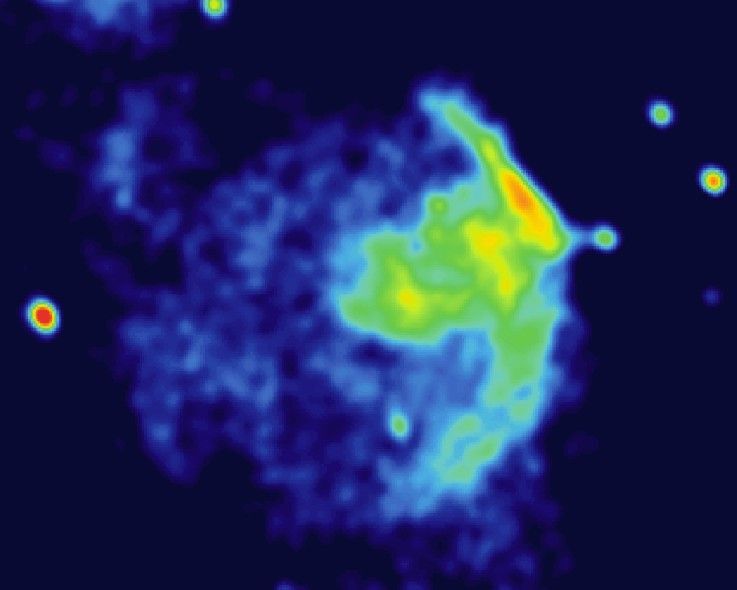Pulsar B1757 and Supernova Remnant G5.4-1.2
Description
Color representation of radio emission from the supernova remnant G5.4-1.2 (large scale image) and the associated pulsar B1757-24 (insets). Blue indicates fainter radio emission, yellow and orange more intense radio emission. The supernova remnant lies 15,000 light-years away in the constellation Sagittarius. The pulsar has travelled outside the shell of debris from the supernova explosion that created it. The pulsar and the shell together are dubbed "The Duck," because of their unusual appearance. Stars much more massive than the Sun end their normal lives in violent supernova explosions, leaving behind an extremely dense neutron star. Some of these neutron stars produce the beams of electromagnetic radiation that characterize pulsars. For the pulsar B1757-24 to have travelled from the center of the supernova remnant to its present position in 16,000 years, it would have to be moving at about 1,000 miles per second, a particularly high speed compared to other pulsars. By comparing images taken with the VLA in 1993 and 1999, scientists were able to measure the pulsar's change in position over a known time, and thus to calculate its speed. They were surprised to find the pulsar moves at a maximum of about 350 miles per second. This means the pulsar took much longer to reach its current position, and so it is a much older object than previously believed.
Left image: Archival VLA 90cm image of SNR G5.4-1.2, resolution=60"x45", peak intensity is 150 mJy/beam. The region containing the pular PSR B1757-24 is boxed. Right: VLA BnA-array 3.3cm observations of the radio emission associated with B1757-24. The lower image measures 20"x12", with a resolution of 0.9".
Creator
Legacy Astronomical Images
Rights
NRAO/AUI/NSF does not hold full copyright for this image. Contact the archivist for details.
Type
Legacy Astronomical Image
Object Name
PSR B1757-24
Investigators
Bryan Gaensler, Dale Frail
Telescope
Very Large Array (VLA)
Observation Date
1999-10-23
Type of Observation
continuum
Band
X
Wavelength
3.3cm
Frequency
8.4 GHz
Center of Image
RA 17:59:59.970, Dec: -25:5:11.800 (J2000)
Field of View
0.750000 x 0.750000 degrees
Link to journal article
Series
Galactic Sources Series
Unit
Pulsars/Neutron Stars Unit
Citation
Legacy Astronomical Images, “Pulsar B1757 and Supernova Remnant G5.4-1.2,” NRAO/AUI Archives, accessed April 1, 2025, https://www.nrao.edu/archives/items/show/33470.

